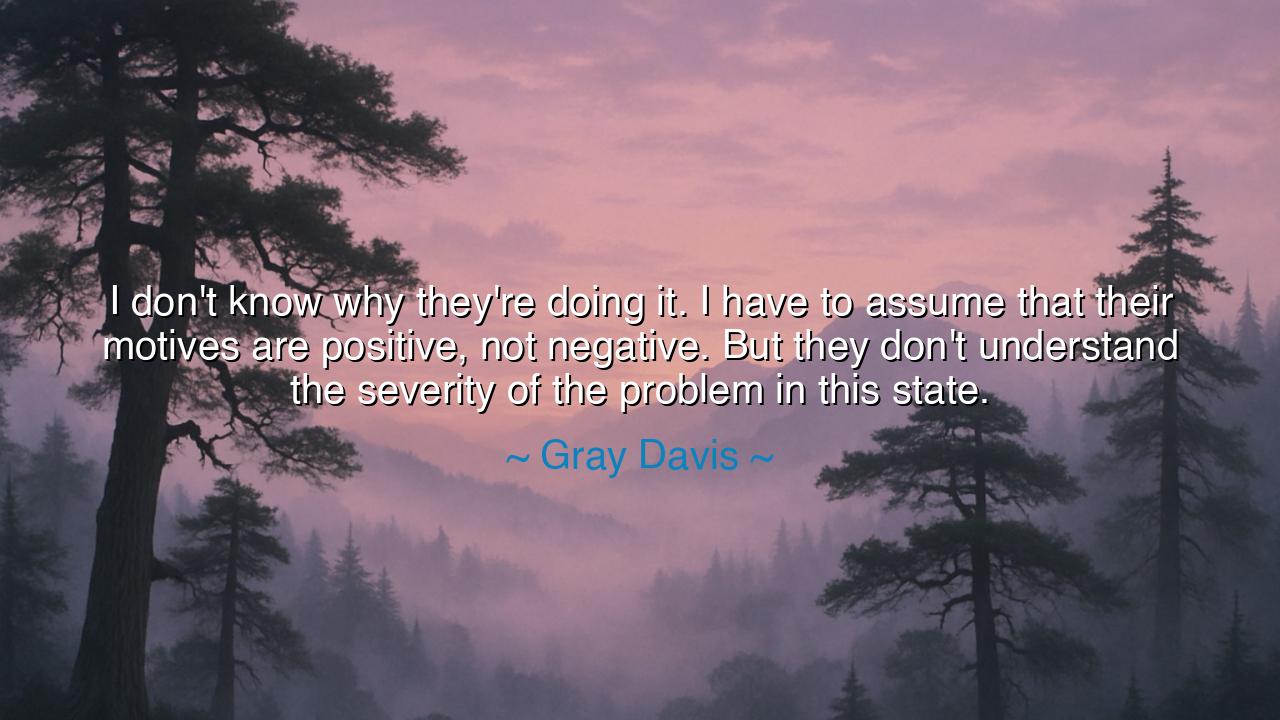
I don't know why they're doing it. I have to assume that their
I don't know why they're doing it. I have to assume that their motives are positive, not negative. But they don't understand the severity of the problem in this state.






Hear the words of Gray Davis: “I don’t know why they’re doing it. I have to assume that their motives are positive, not negative. But they don’t understand the severity of the problem in this state.” Here speaks the voice of one burdened with responsibility, striving to judge with fairness yet weighed down by the urgency of crisis. It is the eternal trial of leaders: to assume the best in men’s intentions, yet to see clearly when their actions fall short of the need.
The ancients knew this paradox well. When the Senate of Rome debated while Hannibal stood at the gates, some counseled patience, believing their peers acted with positive motives. Yet hesitation nearly doomed the city, for good will cannot erase the severity of the problem. Davis’s words echo this truth: that to misjudge the scale of danger is as deadly as malice, and that in times of trial, ignorance can wound as deeply as treachery.
Consider also the tale of the Trojan priest Laocoön. When the wooden horse stood before the walls, he warned his people of the hidden problem. Yet others, thinking the Greeks’ gift born of positive intentions, dismissed his cry. Their failure to grasp the severity of the moment led to ruin, though no ill intent guided the citizens who welcomed the horse. So it is in all ages: misunderstanding the weight of danger can topple even the strongest walls.
Yet there is nobility in Davis’s words. For he refuses to assume negative motives; he grants his opponents the dignity of goodwill. This is wisdom, for to see only malice blinds the heart, while to allow for virtue keeps open the path of reconciliation. The true leader must balance vigilance with charity, guarding against peril while holding faith in the possibility of righteousness.
So let the generations remember: good motives are not enough when the problem is great. To misjudge danger is to invite ruin, even if one acts in innocence. Yet never should we fall into the error of assuming wickedness where there may be ignorance. The teaching is balance: to guard against threats with open eyes, yet to weigh others’ hearts with justice. In this way, both wisdom and mercy may guide the fate of the state.






NNNAM NGUYEN
Gray Davis seems caught between assuming good intentions and recognizing a significant gap in understanding. How can we foster a deeper understanding of complex issues, especially when people’s actions are motivated by a desire to help but fall short? Is there a way to bridge the divide between intent and comprehension in these situations?
DHNguyen Duc Hieu
The assumption of positive motives here raises an important point about how we often view people’s actions. Is it enough to assume others mean well, or should we be more skeptical when their actions are clearly misaligned with the problem at hand? How do we strike a balance between optimism and critical evaluation of others’ understanding?
DNTran Duc Nhan
It’s interesting that Davis has to assume positive motives despite seeing a lack of understanding of the issue. How often do we find ourselves in situations where we have to trust others’ intentions even though their actions don’t align with our sense of urgency or awareness? What does this say about the role of perception versus reality in decision-making?
CC.Linh
Gray Davis’ comment seems to touch on a sense of frustration with those who may be acting with good intentions but fail to grasp the gravity of the problem. How can leaders ensure that others understand the true scope of a situation before making decisions? Can goodwill alone overcome a lack of understanding, or is expertise necessary for effective action?
NHDo Nguyen Ha
This quote speaks to the difficulty of understanding others' motives when faced with critical issues. If Davis feels that the severity of the problem isn't fully understood, is this a reflection of a broader communication gap? What happens when people’s intentions are good, but their actions fall short due to lack of awareness or insight?